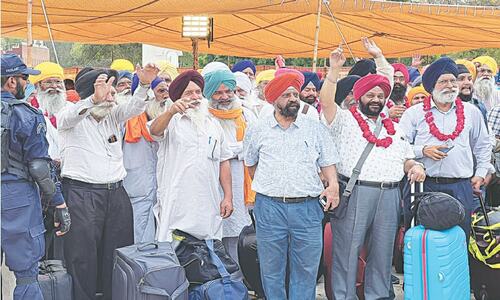TAXILA: Several thousand Sikh devotees performed ‘Bhog’, the main ceremony of the Baisakhi festival, at Gurdwara Punja Sahib in Hassanabdal on Sunday, as the temple echoed with Sikh religious slogans.
Baisakhi, or Vaisakhi, is celebrated on the first day of the month of Vaisakh and also marks the beginning of the harvest season.
The festival was celebrated at Gurdwara Punja Sahib in Hassanabdal - the third most sacred city for the followers of the Sikh religion - by pilgrims who performed several rituals.
The Gurdwara was awash with colours as the pilgrims crammed the halls and the courtyards in their traditional yellow turbans.
Dressed up to the nines, the worshippers gathered in the early hours of Sunday to perform the rituals which marked the conclusion of the three-day reading of ‘Granth Sahib’ - the holy book of Sikhs.
Devotees perform ‘Bhog’, ‘Keerthan’ and Ardaas; to travel to Nankana Sahib today
It may be noted that Gurdwara Punja Sahib is considered important in the Sikh religion because Sikhs believe that a handprint of Sikhism founder Baba Guru Nanak is imprinted on a boulder at the gurdwara.

On this occasion, girls from the Khalsa School in Peshawar recited hymns.
Following ‘Bhog’, the pilgrims performed ‘Keerthan’ for purification followed by ‘Ardaas’ (prayer). This marked the formal conclusion of the festival and ‘prasad’ (sweetmeats) was also distributed among the pilgrims.
At the end, the ‘Palki’ procession was also taken out during which the passion of the Sikh pilgrims reached its crescendo.
This year’s festival marks the 325rd anniversary of Khalsa - the pure ones - a moniker for the Sikh brotherhood.
It is one of the most significant holidays in the Nanaksahi Sikh calendar, commemorating the establishment of the Khalsa in Anandpur Sahib in 1699 by the 10th Sikh Guru Gobind Singh.
According to reports, around 8,000 Sikhs attended the celebrations. Of these, over 2,400 Sikhs came from India while over 2,000 came from other countries, including the UK, the US, Canada, Australia, and Gulf countries. As many as 2,000 Pakistani Hindus and Sikhs also attended the festival.
For the first time, diplomats from European and South East missions participated in the ceremony and witnessed Sikh devotees offering their rituals.
The leader of the Indian Sikh contingent, Sardar Kulwant Singh, in his address expressed satisfaction over the arrangements made for the pilgrims. In their speeches, representatives of Sikh groups from different countries lauded the Kartarpur corridor and thanked the government for fulfilling their longstanding demand.
Amritsar’s Shiromani Gurdwara Parbandhak Committee (SGPC) party leader Sardar Rawinder Singh told journalists that special love for Pakistanis compelled them to visit the country repeatedly.
“We are grateful to the Pakistan government, particularly the Evacuee Trust Property Board (ETPB), for making arrangements for the protection of gurdwaras in Pakistan,” he added.
Talking to journalists, Defence Minister Khawaja Asif claimed that the government was committed to providing complete religious freedom to people of all faiths living in the country.
Responding to a question, he said that the Sikh Marriage Act had been passed in 2018 and would be implemented after the approval of the Punjab cabinet.
He said that around six gurdwaras would be opened across the country and handed over to the Sikh community.
Earlier, speaking at the Bhog ceremony, Khawaja Asif said that the people of Pakistan and the government were proud to host the Sikh pilgrims in their holy land.
ETPB Additional Secretary Rana Shahid said the pilgrims would travel to Nankana Sahib from Hasanabdal today, where they would pay homage at ‘Sacha Sauda’ (Farooqabad) during their stay.
This will be followed by a visit to Gurdwara Darbar Sahib Kartarpur (Narowal) on April 18, he said, adding that the pilgrimage will continue with a visit to Gurdwara Rori Sahib in Eminabad on April 20. The devotees will leave Pakistan on April 22 following the completion of their 10-day pilgrimage, he added.
National Rahmatul-lil-Alameen Authority Chairman Khurshid Ahmad Nadeem and its director general, Zaffar Mehmood Malik, also participated in the Bhog ceremony.
Published in Dawn, April 15th, 2024













































Dear visitor, the comments section is undergoing an overhaul and will return soon.